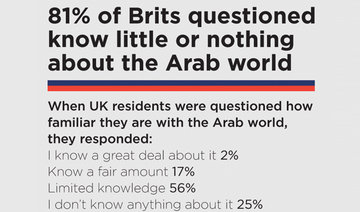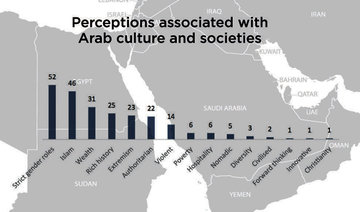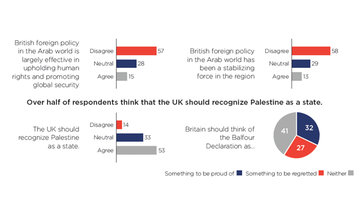LONDON: Seven in 10 Brits think the rise in Islamophobic comments by politicians and others risks fueling hate crime, yet most also have hostile attitudes toward Muslims settling in the country, an Arab News / YouGov poll has found.
The survey, which was commissioned by this newspaper in conjunction with the Council for Arab-British Understanding (CAABU) and polled over 2,000 Brits, brought the country’s conflicted views into sharp focus.
The “UK attitudes toward the Arab world” survey found that while 70 percent of respondents believe “anti-refugee statements by politicians and others” increase the risk of hate crime in the UK, 55 percent also support “racial profiling against Muslims/Arabs for security reasons.”
The survey also revealed that 41 percent of Brits think migrants and refugees coming from the Arab world to Europe are not beneficial to society.
The results found a clear split according to how Brits voted in the referendum to leave the EU. Just 22 percent of “Brexit” voters believe Arabs who have migrated to the UK have “made an effort” to adapt and integrate into Western society, compared to 55 percent who voted for the UK to remain part of the EU.
Scott Lucas, professor of international politics at the University of Birmingham, pointed to the disparity in Brits’ views exposed by the poll, with many raising concern over rising Islamophobia, yet simultaneously holding what could be viewed as Islamophobic views.
Lucas told Arab News: “The fact they recognize Islamophobia yet they, themselves, have the same suspicions doesn’t surprise me.
“Our society is not immune to government rhetoric; everyone is being influenced by it, even if they are not aware of it.”
London’s Metropolitan Police Service said the volume of hate crime it records as “Islamophobic attacks” has increased sharply over the last four years. The force recorded 343 incidents in the 12 months to March 2013, and 1,260 in the 12 months to March 2017.
Miqdaad Versi, assistant secretary general of the Muslim Council of Britain (MCB), told Arab News: “Islamophobia is now socially acceptable within society. The government needs to take real action.
“Certain sections of the (British) media are some of the biggest drivers of Islamophobia in the UK. The government should provide guidance to newspapers and work with press regulators and send experts to give advice to shake things up. The government has a long list of things it has said it would do and hasn’t.”
Versi offered the example of the aftermath of the terror attack at Finsbury Park Mosque in June this year. He said, “Both the UK Prime Minster (Theresa May) and the UK Foreign Secretary (Boris Johnson) identified the need to quash Islamophobia at the time, however it is still unclear what actions were taken after making this statement.”
Commenting on the Arab News/YouGov survey, Versi said the idea that many Brits are supporters of Arab racial profiling and dismiss the value of refugees is a subject of concern.
“This is a broader issue than just Arabs, it’s a lack of understanding of the value of immigrants in general,” he said.
Versi urged the UK government to create policies that “tackle these discriminatory views.”
He expressed concern that the language used by politicians needs to be “very carefully thought through to understand the ramifications they have on how certain communities are viewed.”
He added: “A direct link between government rhetoric and Islamophobia is difficult to prove but the atmosphere of hostility that has been created by certain politicians is clear and dangerous. The government needs to take these results very seriously and act on it.”
Shaista Aziz, a British journalist and columnist said “divisive rhetoric can only create hate and not solve hate.”
Aziz, who is the founder of the anti-Islamophobia website “Everyday Bigotry Project,” said when politicians describe immigrants in hateful terms, “it legitimizes and normalizes the demonization of groups of people who are ‘other’.”
She continued: “While many people say they reject racism, they actually believe in things that could be construed as racism.
“For example, refugees don’t have ‘contribute’ anything to society – they don’t have to be scientists and doctors – they should just be respected as human beings.”
She added: “That fact that people say they agree with Arab profiling says it all, doesn’t it? With the current government narrative around Muslims, this doesn’t surprise me.
“Just look at the dominant media headlines and nature of the stories day in, day out. ‘Muslim,’ ‘terrorist,’ ‘refugees’ are not interchangeable terms,” Aziz said.
On the matter of screening Arabs for security reasons, she said: “Obviously everyone needs to be kept safe and people need to be screened for security reasons but if it’s just one group being screened, that’s problematic. Everyone should be subject to checks, not just Muslims.”
Lucas said that racism in the UK is often cloaked in “rational terms, such as those who say ‘the UK can’t take the strain of more immigrants’.”
He said that problems can arise in UK communities where there is limited contact with multicultural groups.
“If the communities don’t have day-to-day contact, they are only subject to images that come from the media, news or shows,” he said. “Yet most of the images shown in the press or media of Muslims are unnatural and they are not depicted doing day-to-day things.”
Aziz urged the British government to take a reality check of the level of bigotry that has been mainstreamed into our politics because “it’s alienating large numbers of British people and causing long-term problems.”
“If Muslims are continually seen as a problem, it’s difficult for some Muslims to feel like they belong – it creates separated groups and foments an ‘us and them’ narrative. This can never be a good thing for society,” she said.
• For full report and related articles please visit: How Brits view Arab world


























